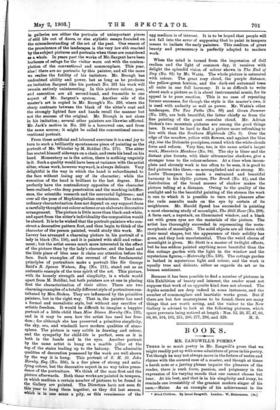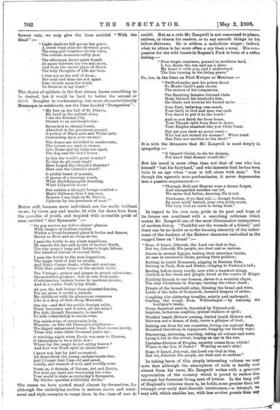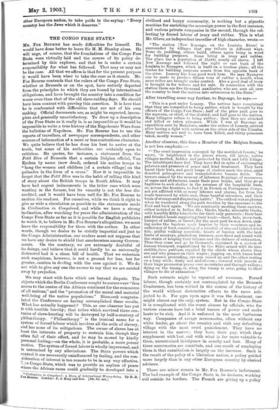BOOKS.
MR. ZANGWILL'S POEMS.*
THERE is so much poetry in Mr. Zangwill's prose that we might readily put up with some admixture of prose in his poetry. Yet though he may not always move in the fetters of metre and rhyme with the assured ease of a master, and though at times a harsh note or a jarring phrase impairs the pleasure of the reader, there is such force, passion, and poignancy in the expression of his varying moods that one cannot choose but hear. At his best, and that is in his simplicity and irony, he reminds one irresistibly of the greatest modern singer of his race,—Heine. As an example of his achievement in the • Blind Children. By Israel ZangwilL London W. Heinemann. 154.3 Sumner vein, we may give the lines entitled " With the Dead "r--
" Light shadows fall across her grave, A sweet wind stirs the flowered grass, The song-girt branches slowly wave, The solemn moments softly pass.
The afternoon draws quiet breath At pause between the eve and morn, And from the sacred place of Death The holy thoughts of Life are born.
I fret not at the will of doom ; Her soul and mine are not apart. Dear violets upon her tomb, Ye blossom in my heart."
The choice of epithets in the first stanza leaves something to be desired, but it would be hard to better the second or third. Rougher in workmanship, but more characteristically Heinesque in sentiment, are the lines headed "Perspective" :
" My feet on the ball of St. Peter's, My head in the radiant skies,' I see the Eternal City
Shrunk to an ant-heap's size : Re-sucked to eternal forest, Absorbed in the greenness around.
0 pother of Black ants and White ants, Contending upon your mound !
The domes are dwindled to mushrooms, The towers are sunk to stones, Live Rome and its ruins are equal, The dog and the lion's bones.
Is this the world's great wonder? To this do all roads lead ?
Here forged the Church's thunder? Here cast the Church's creed ?
0 pitiful breed of mortals, 0 spawn of a teeming womb, What Brobdingnagian boasting, What Liliputian doom !
But sudden a thought brings comfort— Man's littleness thus I can scan, Because I am high on St. Peter's, Upborne by the greatness of man !"
Better still, because more individual, are the really brilliant verses, by turns gay and tender, lit with the dawn fires from the paradise of youth, and inspired with invincible pride of
race, entitled " Asti Spumante " :- " Its pop excites my fellow-diners' glances
With images of reckless revelry.
Within a broad-brimmed glass it froths and dances, Showy as Moet and as cheap as tea.
I pass the bottle to my silent neighbour, He smacks his lips and spouts of mother Earth, The ripe grape's tang and Nature's tropic labour, Her tameless travail of eternal birth.
I pass the bottle to the man loquacious, The tragic bard of Asti he recalls, And Pisa's Campo Santo, white and spacious, With that quaint fresco on the ancient walls:
The Vintage—grapes and grapes in purple splendour; Green-kirtled gleaners ; feet in vats deep-sunk ; O'erbrimming baskets borne by maidens slender, And in a corner Noah lying drunk.
Ah yes, the Asti brings them pleasant fancies, For me alone it works a miracle.
My childhood with its glamorous romances Lies in a drop of that cheap Muscatel.
One sip—and fled the public foreign table, Trust, innocence and wonder, all are mine ! For Asti, though Spumante, is unable To hide relationship to raisin-wine.
The raisin-wine of ceremonies holy, Wherein—to fête old Pharaoh's overthrow— We dipped unleavened bread: the East moves slowly, 'Twas only some three thousand years ago.
O witching night when Earth was near to Heaven, 0 blessedness to be a little Jew !
Where lay the magic in not eating leaven ? And how was Noah aped on raisin-brew?
I know not, but by Asti re-created, All dewy-fresh the young enchantments rise, And I forget that I am old and sated, Lonely, and stained of soul, and worldly-wise.
Prate on, 0 friends, of Nature, Art and Dante, Nor note my tears are weakening the wine. Your world is stale as yesterday's Spumante, My Ghetto sparkles youthfully divine."
The verses we have quoted stand almost by themselves, for although the underlying motive is serious, metre and senti-
ment and style conspire to range them in the class of vers de socitite. But as a rule Mr. Zangwill is not concerned to please, enliven, or charm his readers, or to say smooth things to his fellow-Hebrews. He is seldom a melodious Bingen indeed,
what he utters is far more often a cry than a song. His•com-
passion for the wild beasts in Regent's Park is born of a reflex feeling:— "Poor tropic creatures, penned in northern land,
I, too, desire the sun and am a slave.
My heart is with you, and I understand The lion turning in his living grave."
So, too, in the lines on Paul Kruger at Mentone " Swift-thunder past his prison doors To Monte Carlo's gala shores The motors of his conquerors.
The flaunting females throned elate Make bitterer his kindred's fate, He blinks and mourns his buried mate.
Oom Paul, believing over-much, Your faith in God and man was such You dared to put it to the touch !
And so you finish far from home, Your Temple split from floor to dome, ' Your Empire smashed like yon white foam.
But yet you chew no novel crust—
Who has not staked his dreams ? What trust Has Fate not smitten to the dust?"
It is with the dreamers that Mr. Zangwill is most deeply in sympathy :—
" 0 blessed Christ, to die for dreams, Nor know that dreams would die."
But his mood is more often than not that of one who has himself "lost his fairyland," and who laments that he has been born in an age when " man is left alone with man." Yet though the agnostic note predominates, it never degenerates into a passive acquiescence Through Hell and Heaven were a dream forgot, And unregarded sacrifice our lot, We serve God better, deeming He is not.
Perchance, 0 ye that toil o.i though forlorn, By your souls' travail, your own noble scorn,
The very God ye crave is being born."
In regard to his own race, pride in its past and hope of its future are combined with a searching criticism which makes Mr. Zangwill one of the most illuminative interpreters of modern Jewry. "Faithful are the wounds of a friend," and there can be no doubt as to the burning sincerity of the indict- ment of the dualism of the Hebrew character embodied in the rugged lines on " Israel" :—
" Hear, 0 Israel, Jehovah, the Lord our God is One, But we, Jehovah His people, are dual and so undone.
Slaves in eternal Egypts, baking their strawless bricks, At ease in successive Zions, prating their politics; Rotting in sunlit Roumania, pigging in Russian Pale, Driving in Park, Bois and Prater, clinging to Fashion's tail; Reeling before every rowdy, sore with a hundred stings, Clothed in fine linen and purple, loved at the courts of Kings; Faithful friends to our foemen, slaves to a scornful clique, The only Christians in Europe, turning the other cheek; Priests of the household altar, blessing the bread and wine, Lords of the hells of Gomorroh, licensed keepers of swine; Coughing o'er clattering treadles, saintly and underpaid, Ousting the rough from Whitechapel— by learning the hooligan's trade; Pious, fanatical zealots, throttled by Talmud-coil, Impious, lecherous sceptics, cynical stalkers of spoil; Wedded 'neath Hebrew awning, buried 'neath Hebrew sod, Between not a dream of duty, never a glimpse of God; Risking our lives for our countries, loving our nations' flags, Hounded therefrom in repayment, hugging our bloody rags; Blarneying, shivering, crawling, taking all colours and none, Lying a fox in the covert, leaping an ape in the sun.
Tantalus-Proteus of Peoples, security comes from within! Where is the lion of Judah ? Wearing an ass's skin!
Hear, 0 Israel, Jehovah, the Lord our God is One, But we, Jehovah His people, are dual and so undone."
In taking leave of this deeply interesting volume we may note that although the atmosphere of exile is hardly ever
absent from his verse, Mr. Zangwill writes with a generous appreciation of the country which is proud to reckon him amongst her foremost living men of letters. In the long roll of England's victories there is, he holds, none greater than her triumph over early Anti-Semitic intolerance,—a triumph, we may add, which enables her, with less arrare pens& than any
other European nation, to take pride in the saying : "Every country has the Jews which it deserves."












































 Previous page
Previous page